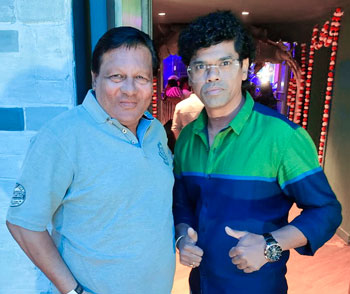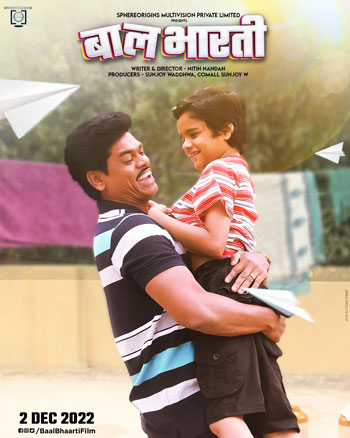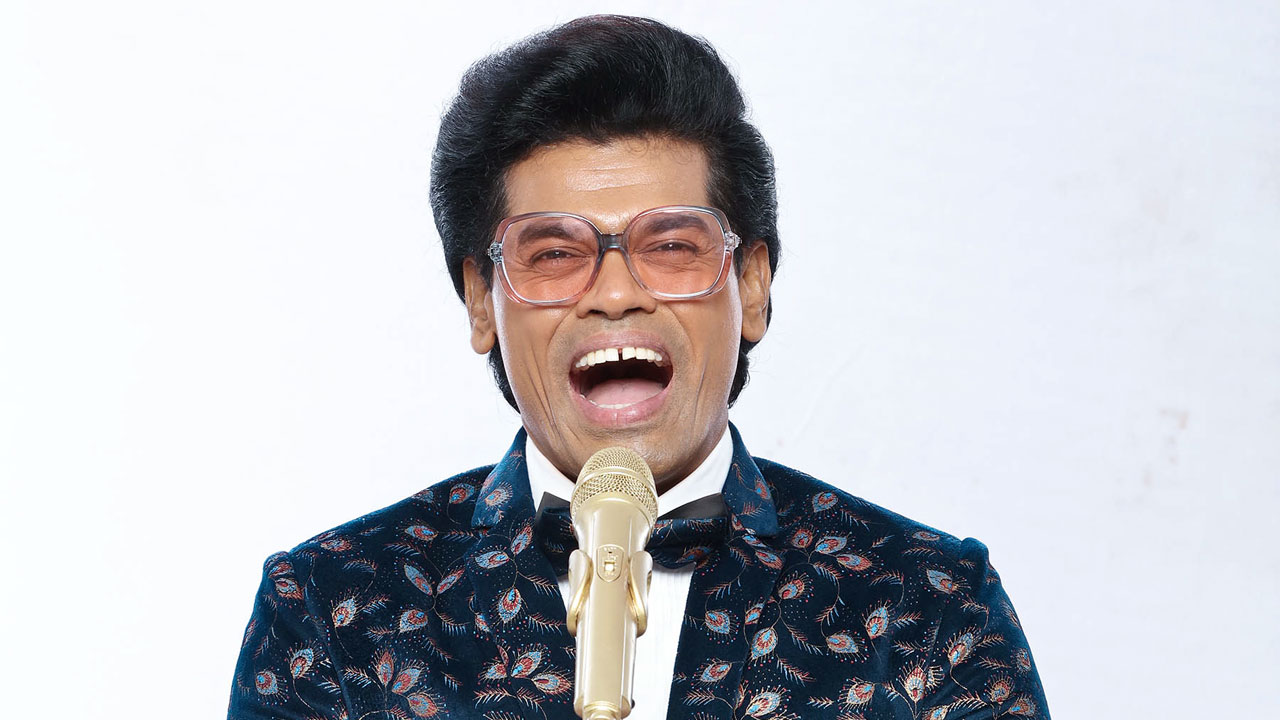Siddharth Jadhav : Comedy King of Marathi Entertainment Industry!
#SiddharthJadhav is #Marathi entertainment industry’s superstar but he refuses to call himself one. Having debuted in a Marathi film #AgaBaiArrecha he has come a long way. Having honed his acting talent on Marathi stage he believes that helps in playing variety of roles. Popularly known as Comedy King of Marathi entertainment industry, he pushes for other genres too as he is confident of playing all kinds of role equally well. Siddharth has done roles in Hindi films like #Golmaal, #GolmaalFununlimited, #Simmba, #Radhe and this year’s most awaited #RohitShetty directorial Cirkus wherein #RanveerSingh has played a double role. During the promotions of his last Marathi release, ‘#Baalbharti’, Siddharth Jadhav had a heart to heart talk with our senior editor Mr Keerti Kadam. Excerpts from it.

You are primarily known for playing comic characters. What prompted you to play a serious father in Baalbharti?
Frankly it’s not a serious role as such. The character has different shades including humorous and emotional. He is a real father of today’s generation who wants his child to get good education. Most of the Marathi families put thrust on education and the character is very relatable. He is an electric diploma holder running a small shop and his wife is a post graduate in Marathi language. Both are keen on giving the best education to their child because in today’s times education has become more competitive. Personally I relate to this role. I take keen interest in both my daughter’s education. I try to provide them whatever they require for that. I am their friend. My father used to be very concerned about our education. As a tribute to him my name in the credits is Siddharth Ramchandra Jadhav.
We used to stay in slums but he made sure that we get proper education. My brother is a Medico and my sister is a Lawyer. I have completed graduation and have done one year of law. So these things came back to my mind while performing. Every parent wants their child to get good education. The film Baalbharti focuses on how to deal with language barriers. It doesn’t say that particular language is good or bad. As an actor and as an audience I have always admired writer, director Nitin Nandan. I always wanted to work with him. He called me in 2019 and I said yes in the first reading itself. I liked the role and was confident that Nitin will guide me in the right direction. He has extracted good performance from me. He used to curtail my intensity to match his vision of the character I portrayed. We, earlier, were to work together in a film having Ashok Mama (Ashok Saraf) and Dilip Prabhavalkar. But things didn’t work out then.
 Nitin is a very sensitive director. He is a master in projecting themes from the eyes of children. I remember his Jhing Chak Jhing where children refrain their farmer father from committing suicide. I would like to say that I am a director’s actor, I ask a lot of questions. I learnt it from my mentor Mahesh Manjrekar who encourages actors to ask questions while shooting, instead of keeping your queries to yourself. It’s not that all the suggestions will be accepted but both, actor and director, get different points of view. Mahesh Manjrekar, Gajendra Ahire, Kedar Shinde, all are super directors and they trust their actors and I have always been grateful to them. Likewise Nitin Nandan too showed faith in me to portray this intricate character, and I say thank you to him too.
Nitin is a very sensitive director. He is a master in projecting themes from the eyes of children. I remember his Jhing Chak Jhing where children refrain their farmer father from committing suicide. I would like to say that I am a director’s actor, I ask a lot of questions. I learnt it from my mentor Mahesh Manjrekar who encourages actors to ask questions while shooting, instead of keeping your queries to yourself. It’s not that all the suggestions will be accepted but both, actor and director, get different points of view. Mahesh Manjrekar, Gajendra Ahire, Kedar Shinde, all are super directors and they trust their actors and I have always been grateful to them. Likewise Nitin Nandan too showed faith in me to portray this intricate character, and I say thank you to him too.
Do you feel restricted while playing roles which are not out and out comedic?
I am aware that people call me a comedy actor. But it’s their perception. They are putting me up in a square which for me is a frame. So it depends how you look at the situations. I am an actor and by saying that I am confident enough to play all kinds of characters. This confidence is given to me by Mahesh Manjrekar sir. I do not go chasing genres but I’ll say genre selects me.
I love doing comedy and am proud that I can make people laugh. Mind you comedy is the toughest genre but I do not want to be entangled only in it. Earlier too I have done roles which did not have comic element to it. In Mi Shivaji Raje Bhosle Boltoy, I played a grey shaded character. In Dream Mall I played a rapist. In Gajendra Ahire’s Paradh I played an extremely different kind of role. I played Ebrahim Bhai in Shikshanachya Aaicha Gho. I played a different kind of role in Dhurala too. Like I said I am an actor and I like to explore different stories, like to play different characters, like to indulge in different genres. Directors allow actors to explore the depth of characters, and as an actor it’s my duty to do it to his satisfaction.
 Do you feel that the teaching patterns in schools should undergo changes?
Do you feel that the teaching patterns in schools should undergo changes?
I am not big enough to comment on that. The education sector has evolved over the years. Though English has gained prominence, it doesn’t mean non-English speaking speakers are less talented. In Baalbharti we are not discussing English being good or bad but how to overcome the fear of learning it. It is a language and if one puts efforts one can learn it, master it. There’s nothing to be ashamed about not being proficient in English. We have shown techniques about how to get over the fright of learning English. In most of the foreign countries people do not know English. But those are highly progressed nations. So the language doesn’t decide the intelligence of a person. Recently the education Minister of Maharashtra said that they are planning to print textbooks of medical sciences and engineering in Marathi so that large number of students could be benefitted.
How do you prepare yourself for a project?
In theatre there are rehearsals where you keep polishing your role. In fact the medium gives you to improvise on a daily basis. These days, for movies, there are workshops. Here everything is taken care of. Apart from how to say your lines, small nuances are worked out. It helps in building up the confidence of an actor. This definitely is a good learning process, especially for an actor like me. I can work out the punches which are going to work and avoid those which may fall flat. You exactly know how the co-actor is going to react, thus helping you in performing. This saves a lot of time when we go on a set. As everything is already worked out the shooting gets speeded up which is beneficial to actors, directors and of course the producers.
I am an inquisitive actor. I am an enthusiastic actor. I am an excited actor. I always want to know more and more about the character I am playing. While doing comedy scenes I improvise a lot. Of course the additions are retained only after the approval of the director. People call me a ‘high energy’ actor. But that comes from wanting to do justice to my character. During workshops you get to learn a lot. For example I was doing a Hindi film. In one of the scenes the director asked to take a particular gait while walking. It sounded odd to me and I told him, ‘Sir, I am doing lead roles in Marathi. I have to think of my fans out there too. They may not like it. Please will you change it?’ He explained and asked me do whatever was required for the scene. I did try couple of ways. He, then showed me 37 different ways of walk which highlited the character and said, ‘You’ll get character out of your role. Always find out what character will do in a given situation’. It was a learning lesson for me. So this is what transpires at workshops. It’s important to chalk out everything before facing the camera.
You have completed 22 years in the industry. Your views on that?
I have completed just 22 years. It’s just a beginning. A long way to go. I am thankful to all my writers and directors to make me reach here. Actors get all the credit for good cinema or good performance. But I give credit to the writers and directors who envision those characters. In Dhurala, I was appreciated for a subtle portrayal but it’s the director who kept me in check. For me Cinema is Cinema, period. I want to be part of it permanently. A lot of people talk of OTT being a threat to cinema. But wasn’t the same was said when television was spreading wings? Audiences need entertainment and we need to cater to that need, irrespective of the medium. OTT is exploring subjects which are taboo to cinema. But bottom line is that everyone should adapt to the changing times.
I am a product of the theatre. I have always liked performing live in plays. And because of plays I am where I am today. All mediums are equal to me. In cinema one needs to work ‘technically’. Mahesh Manjrekar sir always used to tell me, “Siddhu, Catch the camera…” I am not a method actor, directors should channelise my energy. Every director has a different knack. Mahesh sir tells everything during the reading. Gajendra Ahire explains things in just two lines. Others allow me to do whatever I want to do and then make necessary corrections with the intensity etc. For me an actor should keep on thinking, even if it’s futile in the end, but he should keep thinking. I am proud that I represent Marathi industry in Bollywood. Marathi actors are respected all over India.
How do you keep yourself fit, physically and mentally?
I do not have any vices. I don’t smoke, I don’t drink. I am a brand Ambassador of De-Addiction Campaign of Maharashtra State. Ups and downs are part of any profession. In our profession the ratio is high. But one must not get bogged down in difficult situations. One should not lose the focus. If I do not have any work in my hand I’ll not go to the bar, I’ll instead go to the Gym. I am consciously around positive people which ensures mental peace. Of course, physical exercise with keeping in mind your age, is necessary as well as taking proper rest, 8 hours of sleep helps me to remain positive.


